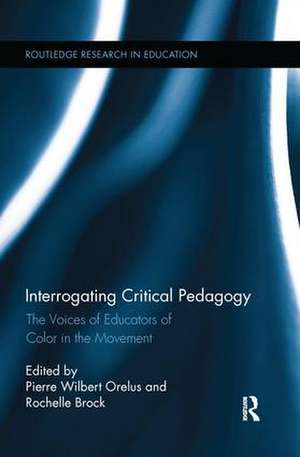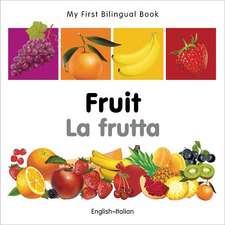Interrogating Critical Pedagogy: The Voices of Educators of Color in the Movement: Routledge Research in Education
Editat de Pierre Wilbert Orelus, Rochelle Brocken Limba Engleză Paperback – 18 noi 2016
| Toate formatele și edițiile | Preț | Express |
|---|---|---|
| Paperback (1) | 356.18 lei 6-8 săpt. | |
| Taylor & Francis – 18 noi 2016 | 356.18 lei 6-8 săpt. | |
| Hardback (1) | 1168.72 lei 6-8 săpt. | |
| Taylor & Francis – 19 noi 2014 | 1168.72 lei 6-8 săpt. |
Din seria Routledge Research in Education
-
 Preț: 310.29 lei
Preț: 310.29 lei -
 Preț: 304.19 lei
Preț: 304.19 lei -
 Preț: 303.18 lei
Preț: 303.18 lei -
 Preț: 147.15 lei
Preț: 147.15 lei -
 Preț: 303.89 lei
Preț: 303.89 lei -
 Preț: 302.17 lei
Preț: 302.17 lei -
 Preț: 303.75 lei
Preț: 303.75 lei -
 Preț: 290.73 lei
Preț: 290.73 lei - 8%
 Preț: 381.60 lei
Preț: 381.60 lei - 9%
 Preț: 867.43 lei
Preț: 867.43 lei -
 Preț: 304.83 lei
Preț: 304.83 lei -
 Preț: 377.85 lei
Preț: 377.85 lei -
 Preț: 401.01 lei
Preț: 401.01 lei -
 Preț: 310.65 lei
Preț: 310.65 lei -
 Preț: 364.04 lei
Preț: 364.04 lei -
 Preț: 129.83 lei
Preț: 129.83 lei -
 Preț: 310.08 lei
Preț: 310.08 lei -
 Preț: 310.22 lei
Preț: 310.22 lei -
 Preț: 310.31 lei
Preț: 310.31 lei - 8%
 Preț: 381.99 lei
Preț: 381.99 lei -
 Preț: 276.13 lei
Preț: 276.13 lei - 9%
 Preț: 935.36 lei
Preț: 935.36 lei -
 Preț: 303.89 lei
Preț: 303.89 lei -
 Preț: 358.67 lei
Preț: 358.67 lei -
 Preț: 400.72 lei
Preț: 400.72 lei - 18%
 Preț: 1060.52 lei
Preț: 1060.52 lei - 18%
 Preț: 1116.74 lei
Preț: 1116.74 lei -
 Preț: 397.75 lei
Preț: 397.75 lei - 18%
 Preț: 1221.80 lei
Preț: 1221.80 lei - 18%
 Preț: 1110.74 lei
Preț: 1110.74 lei - 18%
 Preț: 1053.92 lei
Preț: 1053.92 lei - 18%
 Preț: 1162.84 lei
Preț: 1162.84 lei - 18%
 Preț: 1063.65 lei
Preț: 1063.65 lei - 28%
 Preț: 851.82 lei
Preț: 851.82 lei - 18%
 Preț: 1054.75 lei
Preț: 1054.75 lei - 18%
 Preț: 1054.58 lei
Preț: 1054.58 lei - 18%
 Preț: 1178.85 lei
Preț: 1178.85 lei - 18%
 Preț: 1111.72 lei
Preț: 1111.72 lei - 18%
 Preț: 1057.75 lei
Preț: 1057.75 lei -
 Preț: 489.03 lei
Preț: 489.03 lei - 18%
 Preț: 1059.14 lei
Preț: 1059.14 lei - 18%
 Preț: 1050.09 lei
Preț: 1050.09 lei - 18%
 Preț: 1060.52 lei
Preț: 1060.52 lei - 18%
 Preț: 1062.98 lei
Preț: 1062.98 lei - 18%
 Preț: 1056.28 lei
Preț: 1056.28 lei - 18%
 Preț: 1217.63 lei
Preț: 1217.63 lei - 18%
 Preț: 1060.19 lei
Preț: 1060.19 lei - 18%
 Preț: 1170.84 lei
Preț: 1170.84 lei - 18%
 Preț: 1167.36 lei
Preț: 1167.36 lei
Preț: 356.18 lei
Nou
Puncte Express: 534
Preț estimativ în valută:
68.15€ • 71.16$ • 56.28£
68.15€ • 71.16$ • 56.28£
Carte tipărită la comandă
Livrare economică 15-29 aprilie
Preluare comenzi: 021 569.72.76
Specificații
ISBN-13: 9781138286948
ISBN-10: 113828694X
Pagini: 320
Ilustrații: 3 Line drawings, black and white
Dimensiuni: 152 x 229 x 17 mm
Greutate: 0.45 kg
Ediția:1
Editura: Taylor & Francis
Colecția Routledge
Seria Routledge Research in Education
Locul publicării:Oxford, United Kingdom
ISBN-10: 113828694X
Pagini: 320
Ilustrații: 3 Line drawings, black and white
Dimensiuni: 152 x 229 x 17 mm
Greutate: 0.45 kg
Ediția:1
Editura: Taylor & Francis
Colecția Routledge
Seria Routledge Research in Education
Locul publicării:Oxford, United Kingdom
Public țintă
Postgraduate and UndergraduateCuprins
Foreword by Antonia Darder Introduction: Critical Pedagogy at the Race and Gender Crossroads Pierre Wilbert Orelus Part I 1. Critical Pedagogy of Experience, Caught in the Loops of Seeing and Being: Refusing to Give Up until the Job is Done Leila E. Villaverde & Roymieco A. Carter 2. The Skin We Speak: Locating Black Women in Critical Pedagogy Venus E. Evans-Winters & Joyce Piert 3. Interrogating Critical Pedagogy: Teachers of Color and the Unfinished Project of Social Justice Conra D. Gist 4. Apartheid of Knowledge in Higher Education: Testimonios of Mujeres in Academia Rufina Cortez & Judith Flores Carmona 5. Critical Pedagogy and Youth Education: The Relevance of Indigenous African Cultural Stories George J. Sefa Dei & Isaac Nortey Darko 6. Academic Freedom Fighters: The Perils and Rewards of Teaching about Race and Racism in the Criminal Justice Classroom Dulcinea Lara Part II 7. A Critical Ethic of Care Crystal S. Johnson 8. Using Critical Pedagogy to Teach Social Responsibility and Moral Courage in Nursing Crystal Shannon 9. Mediated Youth, Curriculum, and Cyberspace: Pivoting the In-Between Donyell L. Roseboro 10. Bilingual School Children Can Think Deeper than Developmental Theorists Predict! Readers Theater for Critical Literacy Marisol Ruiz 11. Black Feminist Critical Pedagogy at the Intersection of Curriculum, Alienation, and Identity Politics Stephanie Troutman 12. Creating a New Space and a New Alliance in the Global Age: A Dialogue between Freirian Pedagogy and Seikatsu Tsuzurikata Kaoru Miyazawa Part III 13. Legacy of the Bakhtin Circle in Enlivening Critical Language Pedagogies for Academic Empowerment Myriam N. Torres 14. The Black Male Body in the White gaze: A Critical Pedagogical Analysis Pierre Wilbert Orelus 15. Conceptualizing Emancipatory Discourse in a Composition Classroom: A Critical Pedagogical Analysis Debasmista Roychowdhury 16. "Tolerance and Diversity Cut Many Ways": Conservatism and the American Indian Studies Classroom Caskey Russell & Angela M. Jaime 17. A Collective Struggle: A Testimonio about the Tenure Process in the Borderlands Blanca Araujo Conclusion: Speaking Truth On and About Critical Pedagogy Rochelle Brock
Recenzii
‘It is a critical understanding of [the] liberatory tradition that precisely informs the courageous vision with which Pierre Orelus and Rochelle Brock have brought together, in this volume, the voices of educators of color to speak their own truths. In the process, these authors found a place where they could use their energy to redefine themselves and devise realistic scenarios for altering the present and constructing the future. The result is a powerful volume of diverse voices of educators of color, who contend thoughtfully and creatively with the emancipatory possibilities of critical pedagogy and the difficulties they have known and faced.’ -- Antonia Darder, Loyola Marymount University, USA
'Professors Orelus and Brock offer a timely and important volume that seeks to integrate the discourse of critical pedagogy with the often muted voices of youth, women, and communities of color. These communities are spoken about or acted upon, but too rarely engaged on humane and equitable terms by movements that purport to be in their very interest. The authors not only call out this contradiction in the field; they push the dialogue forward by considering how the inclusion of these missing perspectives can actually grow and transform the field in necessary and powerful ways. The book is a must have for any serious student of critical pedagogy.' -- Ernest Morrell, Teachers College, Columbia University
"A wonderful collection of contributions to critical pedagogy from a multi-ethnic and international perspective.This is the sort of extension to the critical pedagogy debate for which we have been waiting, one with anti-racist overtones. It covers multiple sites of practice. Refreshing, revealing and inspiring." -- Peter Mayo, University of Malta
'Professors Orelus and Brock offer a timely and important volume that seeks to integrate the discourse of critical pedagogy with the often muted voices of youth, women, and communities of color. These communities are spoken about or acted upon, but too rarely engaged on humane and equitable terms by movements that purport to be in their very interest. The authors not only call out this contradiction in the field; they push the dialogue forward by considering how the inclusion of these missing perspectives can actually grow and transform the field in necessary and powerful ways. The book is a must have for any serious student of critical pedagogy.' -- Ernest Morrell, Teachers College, Columbia University
"A wonderful collection of contributions to critical pedagogy from a multi-ethnic and international perspective.This is the sort of extension to the critical pedagogy debate for which we have been waiting, one with anti-racist overtones. It covers multiple sites of practice. Refreshing, revealing and inspiring." -- Peter Mayo, University of Malta
Descriere
Critical pedagogy is often condemned as being mostly dominated by privileged white males, bringing issues of race and gender to the forefront. This volume provides insight on how critical pedagogy can be helpful to scholars and teachers alike in their analysis of racial, gender, linguistic and political problems. It features a wide range of respected scholars who examine the way and the degree to which critical pedagogy can be used to improve education for students of color, women and other marginalized groups.








